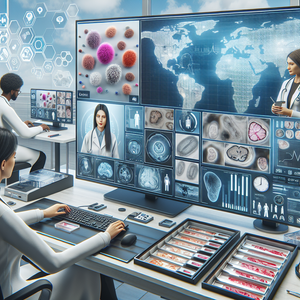
Exploring Careers in Telepathology: Opportunities, Roles, and Insights in a Transformative Field
In an era where technology meets healthcare, telepathology stands out as a groundbreaking approach that revolutionizes how pathologists conduct their work. This innovative field enables medical professionals to analyze tissue samples remotely, dramatically improving diagnostic timelines and expanding access to essential healthcare services, especially in underserved communities. The shift towards telehealth, accelerated by the COVID-19 pandemic, has opened a wealth of career opportunities in telepathology. This article delves into the diverse career paths within this growing sector, outlining the responsibilities and qualifications associated with each role, while also highlighting the broader impact of telepathology on patient care and healthcare systems.
Job Summaries:
Telepathologist:
- Telepathologists serve as the keystone of remote diagnostic practices.
- Utilizing advanced digital imaging to interpret pathology slides from a distance.
- Their work is critical in ensuring accurate diagnoses.
- They collaborate closely with healthcare providers and other specialists.
- Candidates need an M.D. degree, board certification in pathology, and a strong grasp of telepathology technologies.
- By bridging gaps in access to specialized services, telepathologists play a vital role in enhancing patient care, particularly in rural settings.
Digital Pathology Specialist:
- Specialists in digital pathology are the architects of the systems that facilitate remote diagnostics.
- Their expertise lies in managing the technology behind slide scanning and maintaining compliance with industry standards.
- A bachelor's degree in biology or medical technology is typically required, along with hands-on experience in laboratory management.
- These specialists are instrumental in improving the quality and efficiency of diagnostic imaging, directly supporting the telepathology framework.
Cytotechnologist:
- In the realm of telepathology, cytotechnologists analyze cellular specimens to detect abnormalities, playing a crucial role in cancer diagnosis.
- They employ digital technologies for remote evaluations and work alongside pathologists to tackle complex cases.
- A bachelor’s degree in cytotechnology and certification from the American Society of Clinical Pathology (ASCP) are essential for this role.
- Their precision and expertise are vital for ensuring accurate results in telepathology, making them indispensable members of healthcare teams.
Pathology Informatics Specialist:
- The backbone of telepathology services, Pathology Informatics Specialists manage data systems and workflow optimization.
- With a focus on enhancing efficiency and accuracy, they oversee software implementation and analyze laboratory data.
- A degree in health informatics or computer science is typically required, along with experience in laboratory operations.
- Their role is crucial for integrating telepathology into broader healthcare systems, ensuring effective data usage for improved patient outcomes.
Remote Pathologist:
- Remote Pathologists diagnose diseases by evaluating pathology slides transmitted electronically.
- Responsibilities include reviewing digital images and engaging in multidisciplinary teleconferences.
- An M.D. degree with a specialization in pathology is critical for success in this role.
- Telehealth experience is also important for Remote Pathologists.
- They expand access to pathology services, particularly in underserved areas.
- Remote Pathologists contribute to the democratization of healthcare.
Histotechnologist:
- Histotechnologists prepare tissue samples for microscopic analysis.
- Employ state-of-the-art technology to ensure high-quality specimens for telepathology.
- Duties involve embedding, sectioning, and staining tissues.
- Adhere to rigorous quality control standards.
- A bachelor’s degree in histotechnology and ASCP certification are required.
- Their meticulous work directly influences the quality of diagnoses in telepathology.
- Underscore their importance in the healthcare continuum.
Telepathology Trainer:
- Telepathology Trainers play a pivotal role in educating healthcare professionals about the latest telepathology technologies.
- Their responsibilities include developing training materials, conducting workshops, and providing ongoing support to ensure staff are proficient in using these systems.
- A background in education or training, along with experience in pathology, is often needed.
- By equipping healthcare workers with necessary skills, Trainers enhance the overall effectiveness of telepathology services.
Clinical Pathology Consultant:
- Clinical Pathology Consultants lend their expertise to healthcare organizations in optimizing pathology practices and implementing telepathology solutions.
- They evaluate workflows and recommend best practices to enhance service delivery.
- A medical degree and substantial experience in clinical pathology are prerequisites for this role.
- Their insights are crucial for maintaining high standards and integrating new technologies within telepathology services.
Laboratory Manager – Telepathology:
- Laboratory Managers in telepathology oversee the operational aspects of pathology labs utilizing remote diagnostic technologies.
- They ensure compliance with regulations, manage laboratory staff, and optimize workflows.
- Candidates typically need a bachelor’s degree in a relevant field and managerial experience in a clinical setting.
- This role is essential for successfully integrating telepathology into laboratory operations, ultimately improving service delivery and diagnostic accuracy.
Research Scientist – Digital Pathology:
- Research Scientists in Digital Pathology focus on developing innovative technologies that push the boundaries of telepathology practices.
- Their tasks include conducting experiments, analyzing results, and publishing research findings.
- A Ph.D. in pathology or biomedical engineering is often required, along with experience in research methodologies.
- This role is vital for fostering innovation and ensuring telepathology continues to evolve in response to healthcare needs.
The field of telepathology is not only expanding but is also reshaping the future of healthcare delivery. With a variety of career paths available, professionals in this sector can contribute significantly to improving patient care and access to specialized services. As the demand for remote diagnostic solutions grows, individuals interested in pursuing a career in telepathology should be equipped with the relevant skills and knowledge that align with the evolving landscape. By exploring the opportunities highlighted here, aspiring professionals can embark on a fulfilling career in this dynamic and impactful field. Keeping abreast of industry trends and advancements will further empower them to navigate their professional journeys with confidence.
Explore More Jobs

